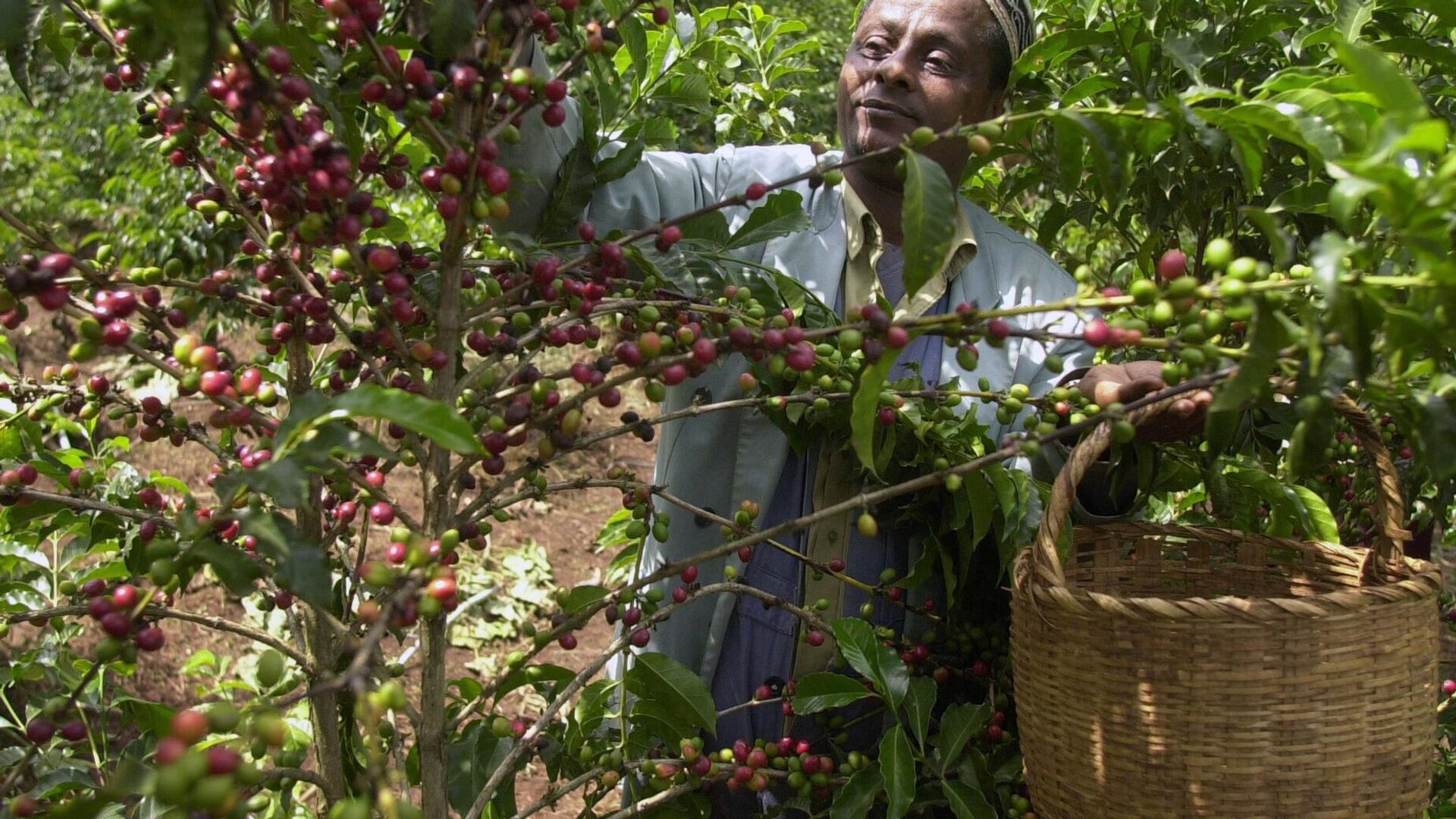https://en.sputniknews.africa/20240508/in-just-nine-months-ethiopias-coffee-exports-bring-in-more-than-835-million-1066426680.html
In Just Nine Months, Ethiopia's Coffee Exports Bring in More Than $835 Million
In Just Nine Months, Ethiopia's Coffee Exports Bring in More Than $835 Million
Sputnik Africa
Ethiopia ranks fifth in the world in terms of Arabica coffee exports and is the largest producer of coffee in Africa, according to the US Department of... 08.05.2024, Sputnik Africa
2024-05-08T16:44+0200
2024-05-08T16:44+0200
2024-05-08T16:55+0200
sub-saharan africa
ethiopia
east africa
coffee
economy
export
trade
https://cdn1.img.sputniknews.africa/img/07e8/05/08/1066430984_0:97:1852:1139_1920x0_80_0_0_7f0924f0bb1001384d91a0dd04b6bf2e.jpg
Over the course of nine months, Ethiopia has generated $835,230 million in revenue thanks to the exportation of coffee, the Ethiopian Coffee and Tea Authority (ECTA) said.Since the beginning of the ongoing Ethiopian 2023/24 fiscal year, which started on July 8, the nation has exported a total of 174,596 tonnes of the product.The Ethiopian government has successfully entered new markets in recent years, in addition to the nations that traditionally import Ethiopian coffee, as Shafi Oumer, the ECTA deputy director-general, was quoted as saying by the state-run Ethiopian Press Agency.China, the United Arab Emirates and Sudan, which previously bought Ethiopian coffee but were not among the top 10 importers, are now ranked 9th, 8th and 7th respectively. Meanwhile, Japan, Saudi Arabia, South Korea, the United States, and Germany have been Ethiopia's primary export markets for coffee throughout the years.Furthermore, Ethiopia earned more than $1.33 billion last year and is projected to earn $1.75 billion this year.Shafi Oumer attributed the success to government reforms: for example, Ethiopia recently allowed foreign companies to buy the commodity directly from farmers and processors, avoiding the middleman of local firms. In addition, work is underway to create associations of farmers that could directly supply coffee to foreign markets.However, he also noted that the country has faced some difficulties this year: a global drop in coffee prices and instability in the Red Sea, which is used for shipping coffee. To solve the latter problem, various solutions have been attempted, including transporting coffee by land.Anyway, it is quite possible that Ethiopia will be able to achieve its goals. This year, world coffee consumption is expected to grow by 2.2% to 177 million bags, with non-producing countries making the largest contribution to the total increase.
https://en.sputniknews.africa/20240417/arabica-coffee-is-older-than-humans-study-finds-1066116161.html
ethiopia
east africa
Sputnik Africa
feedback@sputniknews.com
+74956456601
MIA „Rossiya Segodnya“
2024
Christina Glazkova
https://cdn1.img.sputniknews.africa/img/07e7/0b/07/1063380906_0:0:673:674_100x100_80_0_0_79628b4d0cd9f29291a57aa13bbf9e7a.jpg
Christina Glazkova
https://cdn1.img.sputniknews.africa/img/07e7/0b/07/1063380906_0:0:673:674_100x100_80_0_0_79628b4d0cd9f29291a57aa13bbf9e7a.jpg
News
en_EN
Sputnik Africa
feedback@sputniknews.com
+74956456601
MIA „Rossiya Segodnya“
Sputnik Africa
feedback@sputniknews.com
+74956456601
MIA „Rossiya Segodnya“
Christina Glazkova
https://cdn1.img.sputniknews.africa/img/07e7/0b/07/1063380906_0:0:673:674_100x100_80_0_0_79628b4d0cd9f29291a57aa13bbf9e7a.jpg
ethiopia, east africa, coffee, economy, export, trade
ethiopia, east africa, coffee, economy, export, trade
In Just Nine Months, Ethiopia's Coffee Exports Bring in More Than $835 Million
16:44 08.05.2024 (Updated: 16:55 08.05.2024) Christina Glazkova
Writer / Editor
Ethiopia ranks fifth in the world in terms of Arabica coffee exports and is the largest producer of coffee in Africa, according to the US Department of Agriculture. Coffee constitutes the principal export revenue stream for Ethiopia, contributing approximately 30-35% to the nation's overall export earnings.
Over the course of nine months, Ethiopia has generated $835,230 million in revenue thanks to the exportation of
coffee, the Ethiopian Coffee and Tea Authority (ECTA)
said.
Since the beginning of the ongoing Ethiopian 2023/24 fiscal year, which started on July 8, the nation has exported a total of 174,596 tonnes of the product.
The Ethiopian government has successfully entered new markets in recent years, in addition to the nations that traditionally import Ethiopian coffee, as Shafi Oumer, the ECTA deputy director-general, was quoted as saying by the state-run Ethiopian Press Agency.
China, the United Arab Emirates and
Sudan, which previously bought Ethiopian coffee but were not among the top 10 importers, are now ranked 9th, 8th and 7th respectively. Meanwhile, Japan, Saudi Arabia, South Korea, the
United States, and Germany have been Ethiopia's primary export markets for coffee throughout the years.
Furthermore, Ethiopia earned more than $1.33 billion last year and is projected to earn $1.75 billion this year.
Shafi Oumer attributed the success to government reforms: for example, Ethiopia recently allowed foreign companies to buy the commodity directly from
farmers and processors, avoiding the middleman of local firms. In addition, work is underway to create associations of farmers that could
directly supply coffee to foreign markets.
However, he also noted that the country has faced some difficulties this year: a global drop in coffee prices and instability in the
Red Sea, which is used for shipping coffee. To solve the latter problem, various solutions have been attempted, including transporting coffee by land.
Anyway, it is quite possible that Ethiopia will be able to achieve its goals. This year, world coffee consumption is expected to grow by 2.2% to 177 million bags, with non-producing countries making the largest contribution to the total increase.



